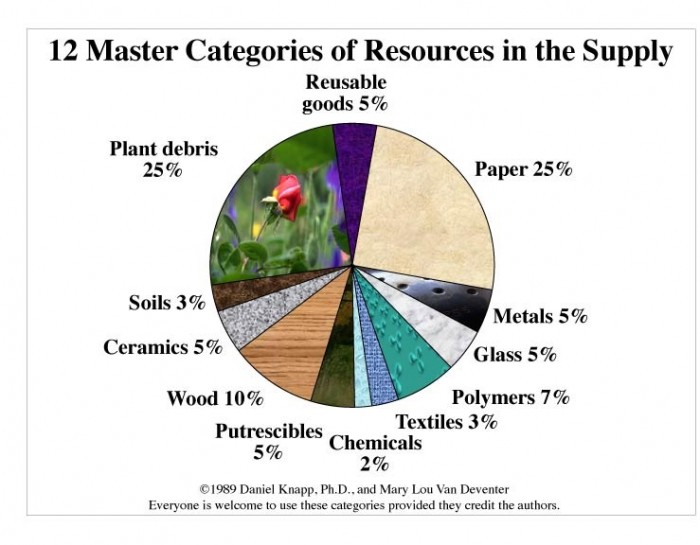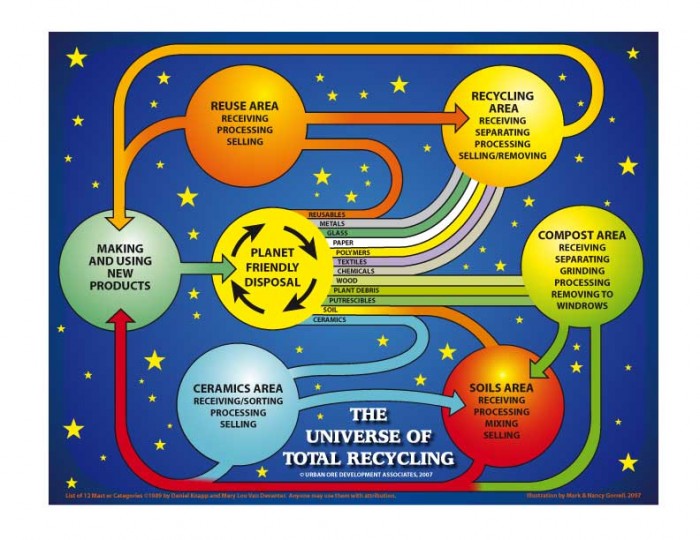Zero Waste Science – Twelve master commodities comprise the entire discard supply anywhere in the world.
Our discovery of the twelve master commodity categories was first reported formally at the Governor’s Conference on Solid Waste and Recycling in Charleston, West Virginia in 1986. Dan Knapp gave the keynote speech and showed the makeup of the twelve categories using pictures of each category of resource.
The heart of this presentation was this pie chart showing the twelve master commodities’ contribution to the total municipal supply of discards using an estimate that combines weight and volume. The presentation represented the culmination of almost a decade of work and studies. The City of Berkeley hired a disinterested engineering firm, Cal Recovery Inc., to use these categories for a profile the Berkeley discards. The study showed there was nothing left out and nothing left over, and the estimates were close to that particular discard supply. The proportions will vary from place to place. This is the only set of categories based on recovering everything for market, and the only one that includes reusables, which can come from any of the other categories.
Download the West Virginia Report
Recognizing the twelve master categories helps to transform wastes into tradeable commodities.
The twelve commodities are:
- 05% Reusable goods
- 25% Paper
- 05% Metals
- 05% Glass
- 07% Polymers
- 03% Textiles
- 02% Chemicals
- 05% Putrescibles
- 10% Wood
- 05% Ceramics
- 03% Soils
- 25% Plant Debris
Download the Universe of Total Recycling (552k pdf).
Recycling Terminology
These definitions were developed for all participants to use during NCRA’s (Northern California Recycling Association) one-day educational workshop, The Right to Recycle: Who’s Right? Their purpose is to be sure that participants refer to the same ideas accurately. They are not written in stone, but for the most part they are written in the common usage of our culture.
We need to agree on new terms because the old ones evolved when recycling was not considered a major method of disposal. Their denotation (written meaning) sometimes says one thing while their connotation (the meaning between the lines; the attitude; the implication) says something else.
For example, “solid waste” may mean anything discarded, by denotation. But calling all discards “waste” colors them emotionally and puts them in an incorrect light for working with them as commodities.
When there is a conflict between denotation and connotation, we experience confusion without knowing exactly why.
To envision a robust recycling industry clearly, we must use terms that point in a single direction with both their denotation and connotation. This list is a starting point. The terms are presented in an order we hope makes conceptual sense. For a more detailed explanation of these terms, download Definitions of the Day (200k doc).
- Discards
- Materials that somebody wants to get out of his or her life. As a verb, “to discard” means the same as “to throw away.” No particular disposal system is implied.
- Disposal
- Taking discards out of someone’s life and doing something with them. Disposal options include selling for reuse, giving to someone, recycling into new products, and wasting by landfilling or burning. Disposal may be free, or one may be required to pay for the service. One may dispose of banana peels or a parent’s estate.
- Garbage
- Discards that are worthless. In practice, their value has usually been destroyed because they have been mixed and contaminated. Since garbage is by definition worthless, it cannot be recycled. Garbage is generally disposed of by landfilling. Old usage associates garbage with wet materials such as food debris. (In Middle English, “garbage” refers to the entrails of fowls. )
- Recyclables
- Discards that have value either as-is or after processing.
- Commodities
- Valuable materials; materials that can be used or sold.
- Supply of discards
- The aggregate of the discards in an area, such as a city, or in an economic sector. The “municipal supply of discards” or “supply of municipal discards” would be the discards available in a municipality. A “supply of industrial discards” would be available from industry. Access to these supplies is one of the major topics in current disposal debates.
- Commingled
- Recyclable discards that are mixed together in such a way that no material’s value is lost, and the materials can be sorted into valuable categories. (Contrast with “contamination.”)
- Contamination
- Unlike substances that are mixed into or mingled with recyclable materials and that diminish or destroy the utility or value of the recyclables. The level of contamination that renders a given recyclable worthless depends in part on the nature of the contaminant and in part on the technical sophistication of recycling processes. (Contrast with “commingled.”)
- Debris
- Leftovers from some process. Usually used with a preceding word that specifies the source, such as “yard debris” or “construction debris.” The debris may be a single material or many and is more closely associated with the preceding process than with the materials themselves. However, common processes produce debris that usually fits a general profile. For example, “yard debris” is usually composed of plant materials. “Construction debris” is more varied, containing combinations o food, metals, plaster, sheetrock, brick, concrete, and glass.
- Hauler
- A person or company that transports discards to any disposal facility. Haulers may be private or franchised.
- Franchise
- In disposal, franchises usually confer an exclusive right to perform a specified service for a specified period of time. An example would be to permit salvaging from a transfer station for ten years, or to collect specified discards from homes or businesses for ten years. Usually the franchise is spelled out in a document – a contract, or franchise agreement. A franchise in the larger sense is a privilege a government confers that “does not belong to the citizens of the country generally, of common right.”
- Disposal fee
- A user fee paid to an agency, company, or person who disposes of discards. Garbage disposal requires fees that underwrite its entire system of collection and landfilling. Recycling disposal can often charge lower disposal fees because it can sell its commodities. The right to charge disposal fees is a major topic in current disposal debates.




Connect With Us